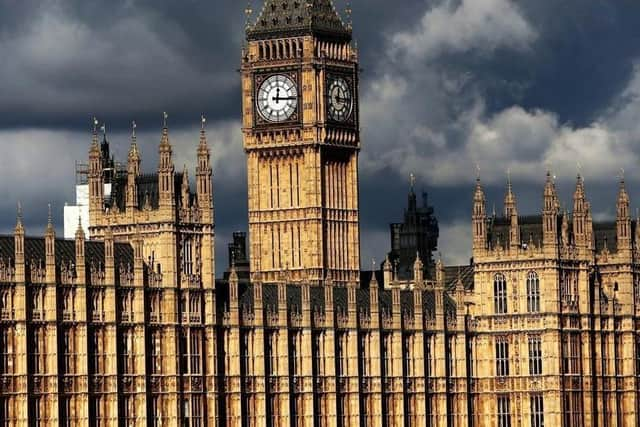Show compassion over loan charge to avoid bankruptcies, MPs tell Rishi Sunak - Greg Wright
It’s particularly important that MPs continue to exert pressure on Ministers and officials over policies which they believe could pose a threat to the mental health and wellbeing of thousands of people.
That’s why anyone who believes in democracy must applaud the actions of the Loan Charge and Taxpayer Fairness All Party Parliamentary Group as it launches a call for evidence to establish the position faced by people impacted by the loan charge.
Advertisement
Hide AdAdvertisement
Hide AdThe cross-party group is seeking evidence because, to quote its press statement, “the Treasury have sought to gloss over the reality of the impact of the loan charge, despite privately admitting that there will be bankruptcies”.


The loan charge was designed to tackle tax avoidance schemes where individuals receive income in the form of loans that are not repaid to avoid income tax.
The Government announced a review in 2019 after the policy left thousands of people on modest incomes with large and unexpected tax bills.
In December 2019, the Government announced a package of changes to the loan charge in response to Sir Amyas Morse’s review, but the APPG still believes the policy is flawed.
Advertisement
Hide AdAdvertisement
Hide AdGreg Smith MP, Co-Chair of the Loan Charge and Taxpayer Fairness APPG - who is a Conservative - said: “The loan charge remains a significant and deeply worrying issue and the Loan Charge and Taxpayer Fairness APPG will continue to raise it.
“We wish to understand the situation facing those facing the loan charge and those who have settled, so that we can even more strongly make the case to the Treasury to show compassion and to come up with a fair resolution that avoids the many bankruptcies and breakdowns that otherwise will alas happen.”
In recent months, MPs from across the political divide have continued to raise concerns about the potential harm being inflicted on law abiding people by the loan charge.
For example, Ruth Cadbury, the Labour MP for Brentford and Isleworth, told the Commons: “We know that there are many, many thousands of nurses, social workers and other public sector workers who have been caught up in the loan charge. They took work via agencies that basically told them, “Sign here or you don’t get the work.” Checking to see whether they would be liable for the loan charge was not an option.”
Advertisement
Hide AdAdvertisement
Hide AdMore than 140 Parliamentarians have signed an open letter to the Prime Minister and the Chancellor calling for a resolution to the loan charge.
In a written response, Lucy Frazer, Financial Secretary to the Treasury, recently said the Government took concerns about the wellbeing of all taxpayers seriously and recognised that the loan charge can add significant pressures for some of them.
She added: “Following Lord Morse’s independent loan charge review, the Government has taken further steps to mitigate the impact of the loan charge and to ensure that the right support is in place for those who need it.”
HMRC has said the loan charge was introduced to ensure those who used disguised remuneration tax avoidance schemes paid their fair share of income tax and national insurance contributions.
Advertisement
Hide AdAdvertisement
Hide AdA spokesman told me recently: “Individuals are responsible for their own tax affairs, and it is only right that we continue to tackle these type of avoidance schemes as they deprive our public services of vital funding.”
"Sir Amyas Morse led an independent review into the policy in 2019 and concluded that it was right that the loan charge remain in force. The Government recognised concerns around its impact, which is why it accepted all but one of the recommendations made, leading to significant changes in legislation.
"We encourage anyone who is worried about paying their Loan Charge to contact us so we can help.
"We are committed to working with taxpayers to enter manageable payment plans to spread their tax liability and ensure that they are affordable.
Advertisement
Hide AdAdvertisement
Hide Ad"HMRC will take action against schemes marketed as enabling contractors to pay less tax than they should. Contractors who are worried that they have been offered such a scheme can contact HMRC."
The evidence compiled by the APPG should be studied closely by MPs and the Treasury. It’s time to ask some fundamental questions. Does the loan charge serve the public interest? And if not, why won’t the Government consider plans for a “fair resolution", which have been drawn up by respected tax professionals”?
Is effective action being taken against promoters of these types of schemes? And if not, how do we stop this type of scandal from happening again?
The buck stops with the Chancellor. Rishi Sunak can display wisdom and compassion by analysing the evidence with an open mind.
Comment Guidelines
National World encourages reader discussion on our stories. User feedback, insights and back-and-forth exchanges add a rich layer of context to reporting. Please review our Community Guidelines before commenting.
